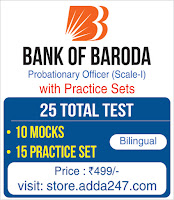SBI PO और NIACL Assistant की परीक्षा के लिए अब केवल कुछ ही दिन शेष हैं. यह समय SBI PO Prelims और NIACL Assistant Prelims 2017 की परीक्षा के लिए अपनी तैयारी में तेजी लाने का है. यह अंग्रेजी के प्रश्न आपको BOB PO और NICL AO 2017 recruitment examination में भी बेहतर अंक प्राप्त करने में सहायता करेंगे. हम व्याकरण अनुभाग के लिए study notes भी प्रदान कर रहे है. और आप New Pattern English Questions का भी अभ्यास कर सकते है.
Directions (1-10): In the following passage there are blanks, each of which has been numbered. These numbers are printed in the passage and against each, five words are suggested, one of which fits the blanks appropriately. Find out the appropriate word in each case.
April 26 is World Intellectual Property (IP) day. Over the years, global IP –(1)– have steadily expanded beyond World Trade Organisation (WTO) requirements, thanks to free trade agreements such as the Regional Comprehensive Economic Partnership (RCEP) which India is currently –(2)— with its trading partners. But there is new cause for worry. Apart from increasing the scope of existing IP rights, there is a move to create new IP-like rights. A case in point is data exclusivity over clinical trial data submitted by drug companies to the regulatory authorities for market approval, the grant of which could severely undermine access to medicines.The propensity to expand the universe of IP is not new: businesses have demanded patent protection for the way they do business; motorcycle manufacturers have got into dispute over the trademark on the exhaust sound of motorcycles; and animal activists have fought for copyright in a selfie taken by a monkey. IP in the modern world defies definition, transcends boundaries and has become synonymous with ascribing value to things that we don’t fully understand. The issue of whether India should offer data exclusivity — one of the key issues discussed in the RCEP — is tied to our understanding of what amounts to IP and whether we are obliged to protect it.
Data exclusivity prevents drug –(3)— from referring to or relying on data submitted by an originator company relating to a drug’s safety and —(4)— while approving bioequivalent versions of the same drug, i.e. therapeutically equivalent generics and biosimilars for a fixed period of time. A drug that comes to the market for the first time undergoes extensive pre clinical and clinical trials on animals initially and human beings later before it is introduced for public use — a time-consuming and expensive process. Developed countries, on behalf of their pharmaceutical lobbies, seek data exclusivity in developing countries arguing that this is necessary to recognise and incentivise the efforts put in to bring a new drug to the market along with recovering the research and development costs incurred — arguments similar to those used to justify the grant of patents. However, such exclusivity would prevent market entry of generic versions of the drug, which could be —(5)— to the larger public interest. Pharmaceutical companies have been pushing for data exclusivity to prolong already existing —(6)— and delay competition from generics even after the expiry of the 20-year patent term or to gain exclusivity on non-patented drugs. In India, such a system may negate the impact of Section 3(d) of the Patents Act, which disallows evergreening patents. With data exclusivity, a company could nevertheless gain exclusive rights over such drugs even though they are not patented. This is because during the period of exclusivity, regulators are barred from using the originators’ data to grant marketing approval to generics; generic companies would then be required to repeat the entire cycle of clinical trials already conducted instead of merely establishing bioequivalence to prove efficacy. As seen in countries where data exclusivity is granted, generic companies do not undertake such clinical trials and their versions of the drug accordingly stay off the market as long as the period of data exclusivity lasts. With restricted market entry of generics, artificially high drug prices remain which puts medicines beyond public reach. Apart from the financial costs, repeated clinical trials on human subjects raise ethical and moral concerns.Unlike in the West, India does not offer data exclusivity and allows bioequivalent generics to be registered based on, among other things, trial data available in the —(7)—- domain.
The argument that clinical trial data needs exclusivity in the light of the money expended is an untenable one. Automotive companies spend millions of dollars on data generated in car crash tests to ensure passenger and —(8)—- safety. Automotive companies have not made any —(9)— claim on the data generated, yet. Unlike automotive companies which use crash test dummies, pharmaceutical companies that test their drugs on human subjects have a greater obligation to make the data public and IP-free. The Agreement on Trade-Related Aspects of Intellectual Property Rights (TRIPS) does not mandate data exclusivity. Providing data exclusivity is a TRIPS-plus measure. According IP-like protection to data exclusivity is not advisable for three reasons.
First, it is an absolute protection granted without any institutional check such as opposition and revocation as available in other forms of IP and ends up as an irrevocable exclusivity to the originator. Second, the U.S. Supreme Court in Mayo v. Prometheus, 132 S. Ct. 1289 (2012) has excluded —(10)— protection to biological correlations, terming it as an extension of natural laws. Extending IP-like protection to clinical observations — the primary objective of data exclusivity — will open a window to claim exclusivity in a subject matter traditionally excluded under patent law. Third, offering IP-like exclusivity solely on the basis of money spent in regulatory testing will set a bad precedent for other industries that may now claim an IP when there is none.
Q1.
(a) assembly
(b) values
(c) standards
(d) morals
(e) mortal
Q2.
(a) fighting
(b) demonstrating
(c) assembling
(d) neglecting
(e) negotiating
Q3.
(a) regulators
(b) addict
(c) conflict
(d) usurp
(e) manufacturer
Q4.
(a) inefficient
(b) efficacy
(c) danger
(d) security
(e) adrenal
Q5.
(a) appealing
(b) hazardous
(c) beneficial
(d) detrimental
(e) acceptable
Q6.
(a) monocytes
(b) monotony
(c) monogamous
(d) monogamy
(e) monopoly
Q7.
(a) personal
(b) public
(c) private
(d) particular
(e) patriarch
Q8.
(a) pedestrian
(b) perennial
(c) peripheral
(d) peripheral
(e) parochial
Q9.
(a) propensity
(b) property
(c) proper
(d) proprietary
(e) propitious
Q10.
(a) patient
(b) patent
(c) petulant
(d) petal
(e) pertinent
Directions (11-15): In each of the following questions a related pair of words is followed by four pairs of words or phrases. Select the pair that best expresses a relationship similar to the one expressed in the question pair.
Q11. ARBORETUM : PLANTS
(a) menagerie : animals
(b) field : grass
(c) botany : herbs
(d) grotesque : jokes
(e) None of these
Q12. DIABETES : DISEASE
(a) blood : heart
(b) pen : tool
(c) sorcery : spirits
(d) novel : prose
(e) None of these
Q13. CHRONOMETER : ERGOMETER
(a) sequence : energy
(b) color : voltage
(c) time : work
(d) revolution : illumination
(e) None of these
Q14. BEER :BARLEY
(a) whiskey : corn
(b) bourbon : hops
(c) bread : yeast
(d) vodka : grapes
(e) None of these
Q15. FUSTY : MUSTY
(a) fetish : aversion
(b) bias : disinterested
(c) noisome : fetid
(d) predisposition : fairness
(e) None of these















